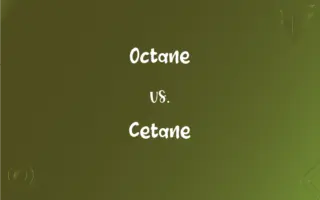Disc vs. Disk: What's the Difference?
Edited by Aimie Carlson || By Harlon Moss || Published on January 23, 2024
Disc is generally used for optical media like CDs and DVDs. Disk often refers to magnetic storage devices like hard drives.

Key Differences
"Disc" is primarily used in the context of optical media, such as CDs (Compact Discs) and DVDs (Digital Versatile Discs), which store data that is read by lasers. "Disk," however, is more commonly associated with magnetic storage devices, like floppy disks and hard disk drives, where data is read and written magnetically.
In terms of spelling preferences, "disc" is favored in British English, often encompassing a broader range of flat, circular objects beyond optical media. In American English, "disk" is more prevalently used, especially in the context of computer storage and astronomy (e.g., celestial disks).
The usage of "disc" in medical and anatomical terms, such as intervertebral discs, highlights its application beyond data storage, emphasizing a broader physical description. "Disk" is used in technology and computing, including terms like 'disk space' and 'disk cleanup.'
When discussing digital storage media, "disc" refers to media that are usually read-only or write-once, such as CD-Rs or DVD-Rs. "Disk" refers to media where data can be erased and rewritten multiple times, like in hard drives or USB flash drives.
In photography and graphic design, "disc" can refer to circular reflectors or filters. In contrast, "disk" is used in astronomy and other sciences to describe objects with a flat, circular shape, like the disk of a galaxy or a planetary disk.
ADVERTISEMENT
Comparison Chart
Media Type
Optical (CDs, DVDs)
Magnetic (Hard drives, Floppy disks)
Usage
Data storage read by lasers
Data storage read/written magnetically
Spelling Preference
British English
American English
Examples
CD-ROM, Blu-ray disc
Hard disk drive, Floppy disk
Non-Storage Usage
Intervertebral discs (medical)
Celestial disks (astronomy)
ADVERTISEMENT
Disc and Disk Definitions
Disc
Medical term for spinal components.
He suffered a slipped disc in his back.
Disk
Used in computing terms.
My disk space is almost full.
Disc
Write-once digital storage.
The software came on a DVD disc.
Disk
American English spelling for circular objects.
The planet's orbit was shown as an elliptical disk.
Disc
Refers to items like reflectors in photography.
She used a reflector disc for better lighting.
Disk
Magnetic storage media.
The computer's hard disk stores all our data.
Disc
Optical storage media.
I burned the presentation onto a CD disc.
Disk
Rewritable digital storage.
I saved the files on an external disk.
Disc
Circular, flat object.
The artist used a colored disc in her installation.
Disk
Astronomy term for celestial bodies.
The Milky Way has a spiral disk structure.
Disc
Variant of disk.
Disk
A thin, flat, circular object or plate.
Disc
A thin, flat, circular plate or similar object.
A coin is a disc of metal.
Disk
Something resembling such an object
The moon's disk was reflected in the pond.
FAQs
Can 'disc' and 'disk' be used interchangeably?
Generally, no. They refer to different types of storage media.
What is the main difference between 'disc' and 'disk'?
'Disc' typically refers to optical media like CDs and DVDs, while 'disk' is often used for magnetic storage such as hard drives.
Is the spelling different for 'disc' and 'disk' in British English?
No, the distinction between 'disc' and 'disk' is the same in both American and British English.
Is 'disk' used in photography?
Not commonly. 'Disk' usually refers to digital storage media, not photography equipment.
Does 'compact disc' ever get spelled as 'compact disk'?
No, the correct spelling for the music or data storage medium is 'compact disc.'
Is 'disc' or 'disk' the correct spelling for computer storage?
'Disk' is commonly used for magnetic storage like hard drives, while 'disc' is for optical media like CDs.
Which is correct for a game format, 'disc' or 'disk'?
It depends on the format; modern games on optical media are 'discs', while older floppy-based games are 'disks'.
In astronomy, what does 'disk' refer to?
'Disk' in astronomy refers to a circular, flat structure like the Milky Way's galactic disk.
Does 'disk' have a specific meaning in computer hardware?
Yes, 'disk' often refers to magnetic storage devices, like hard disks.
What does 'disc' refer to in medical terminology?
In medicine, 'disc' often refers to the intervertebral disc in the spine.
How is 'disc' used in sports?
'Disc' is used for objects like a frisbee or a discus.
Is 'disc' used in any specific technological fields?
Yes, in fields dealing with optical media like CD/DVD manufacturing, 'disc' is commonly used.
Are video games on Blu-ray 'discs' or 'disks'?
They are 'discs,' as Blu-ray is an optical media format.
What is a 'floppy disk'?
A floppy disk is an old form of magnetic storage media for computers.
In the context of digital storage, which is more modern, 'disc' or 'disk'?
'Disk' in the form of SSDs is more modern compared to optical 'discs'.
Does 'disk' refer to anything in biology?
Yes, some cell structures or shapes can be described as 'disk'-shaped.
Is 'disc golf' ever spelled as 'disk golf'?
No, the correct spelling is 'disc golf'.
Are CDs and DVDs referred to as 'disks'?
No, they are correctly referred to as 'discs'.
Can 'disk' be used for solid state drives (SSDs)?
Technically, SSDs are not 'disks' in the traditional sense, as they have no moving parts.
What does 'disc' refer to in the context of brakes?
In this context, 'disc' refers to the type of brake used in vehicles, known as disc brakes.
About Author
Written by
Harlon MossHarlon is a seasoned quality moderator and accomplished content writer for Difference Wiki. An alumnus of the prestigious University of California, he earned his degree in Computer Science. Leveraging his academic background, Harlon brings a meticulous and informed perspective to his work, ensuring content accuracy and excellence.
Edited by
Aimie CarlsonAimie Carlson, holding a master's degree in English literature, is a fervent English language enthusiast. She lends her writing talents to Difference Wiki, a prominent website that specializes in comparisons, offering readers insightful analyses that both captivate and inform.






































































